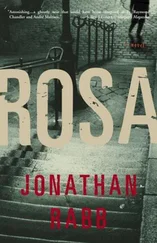Jonathan Rabb - The Second Son
Здесь есть возможность читать онлайн «Jonathan Rabb - The Second Son» весь текст электронной книги совершенно бесплатно (целиком полную версию без сокращений). В некоторых случаях можно слушать аудио, скачать через торрент в формате fb2 и присутствует краткое содержание. Жанр: Политический детектив, на английском языке. Описание произведения, (предисловие) а так же отзывы посетителей доступны на портале библиотеки ЛибКат.
- Название:The Second Son
- Автор:
- Жанр:
- Год:неизвестен
- ISBN:нет данных
- Рейтинг книги:4 / 5. Голосов: 1
-
Избранное:Добавить в избранное
- Отзывы:
-
Ваша оценка:
- 80
- 1
- 2
- 3
- 4
- 5
The Second Son: краткое содержание, описание и аннотация
Предлагаем к чтению аннотацию, описание, краткое содержание или предисловие (зависит от того, что написал сам автор книги «The Second Son»). Если вы не нашли необходимую информацию о книге — напишите в комментариях, мы постараемся отыскать её.
The Second Son — читать онлайн бесплатно полную книгу (весь текст) целиком
Ниже представлен текст книги, разбитый по страницам. Система сохранения места последней прочитанной страницы, позволяет с удобством читать онлайн бесплатно книгу «The Second Son», без необходимости каждый раз заново искать на чём Вы остановились. Поставьте закладку, и сможете в любой момент перейти на страницу, на которой закончили чтение.
Интервал:
Закладка:
“It’s done!” he shouted. “We need a patrol.”
Durruti waited for more of the men to move into the square before he turned and extended a hand to Hoffner.
“It’s fine,” he said. “Just be glad he didn’t hit the explosives.”
Hoffner took the hand, then helped Mila to her feet. She seemed completely unruffled.
She said, “You’re all right?”
Hoffner nodded. He was about to say something when he saw a single figure lying unmoving in the square. The body had fallen forward, the shot clean to the back of the skull. A line of blood had curled down to the mustache.
Even a blind pig.
Hoffner stared at Gabriel’s body and knew that Mila, too, was staring out with him.
“No,” said Hoffner. The force in his tone surprised even him. “We still go.”
“Then you take my man,” said Durruti.
“No.”
They were in the shack. The bearded twenty-year-old stood silently at the door. Mila was sitting by the stove.
Durruti said, “Then you don’t find your son.”
Hoffner looked over at Mila. She was refusing to help him. She was agreeing with Durruti.
Hoffner said, “Gabriel was willing to kill himself for this. Fine. Your man isn’t. It would be for show-you said it yourself. The explosives stay here.”
“And I give you a car and gasoline and bullets because I’m feeling generous? No. You take the explosives-with or without my man-and you plant them. What you do after that is no concern of mine.”
“My son-”
“You think your boy is more capable than Gardenyes or Ruiz?” Durruti let this take root. “They took Gardenyes. They had Ruiz. They nearly killed him. These guns from the Germans will find their way into my country no matter what you or your boy do. We’re done.” He looked at his man. “When the others return, send them out to find the shooter. They buried Ruiz. They’ll want his killer.”
The man nodded and headed out. Durruti turned to the table and, with as much focus as he could, began to study the map.
Hoffner said, “So either I let you sacrifice your man, or I sacrifice myself and the doctor. That’s quite a way to win a war.”
Durruti refused to turn. “It’s the way we win this war.”
“I’ve heard. Men charging at cannons, refusing to dig trenches.” And with perhaps too much bitterness, “Better to be shot full in the chest, in plain view, than to survive like a coward.”
Durruti stood unmoving. When he turned, his face was empty, the heat gone from him.
“These men,” Durruti said. “My men.” It was a rare admission. “For every fifty, I have one who knows how to fight. The rest have passion, daring-what they take for quality. Arrogant men because they fight with ideals, not guns. And it’s these ideals that tell them not to think, not to question, not to die. Sit them down in a trench-where they can learn to flatten themselves against a wall at the first sound of an aeroplane engine or feel the terror of hours trapped in a mudhole with guns and fear staring back at them-and they become nothing. Then they are nothing but sacrifice. And if that’s what they are, this war is already lost.”
Hoffner had misjudged Durruti. The venom wasn’t pride; it was a need to shut out the inevitable. “Then turn them into soldiers.”
Durruti snorted dismissively. “A German speaks. We haven’t time for that. We have numbers-now-and somewhere we have guns: Spanish, Russian. The rebels inside Zaragoza-those troops with all their years of training and killing in Asturias and Morocco-they’re happy to wait. Happy because while they wait my bricklayers and bakers and peasants come to understand what they themselves truly are. So I sacrifice one, and he sacrifices himself, and the passion and daring go on.”
Hoffner stood with no answer. There was no answer for any of this, and Mila asked, “Did you know Gabriel well?”
It took Durruti a moment to remember she was in the room. He looked at her. “Yes.”
“And Gardenyes?”
Durruti hesitated. “Why do you ask this?”
“Because I didn’t,” she said, “and I feel the pain.” She stood. “We do it ourselves, and you keep your man. Show us on the map.”
She stepped passed him. There was a moment between Hoffner and Durruti before they both stepped over. Durruti picked up a wax pencil and began to mark.
She had changed into a silk dress, flower print, sleeves long to the wrist. And her hair was pulled up in a bun.
Durruti had shown them how to get north of the city. It would have made no sense to soldiers at an outpost to have a car coming from the east: How would a German fascist and his lady friend have made it through? Durruti had promised two hours, maybe three, of dirt that passed for tracks and roads, but at least they were avoiding the river.
It was a puzzling terrain, flat and open, at times barren and then wild with green. There were rises here and there, little houses, but more often than not it was the sudden looming of a castle in the distance-ancient and decayed-that traced the path Durruti had given them. Twice they heard gunfire; twice they maneuvered around wagons pulled by mules. Hoffner noticed no neckerchiefs. These were peasants, smart enough to keep their loyalties to themselves. If Durruti pushed through, so be it. Until then, they would wave and nod to anyone passing by.
It was nearly half past one, and the heat in the car was making quick work of the little air coming through the windows. Mila had brought a lipstick. She gave her lips a brown-red coating and looked at herself in a small mirror. As if anticipating his question, she said, “They’ll expect it. Anarchists have bland lips. Fascists have red ones. Not too red. It’s a fine line for God.”
Hoffner nodded but said nothing. He had said very little since the shack. She put the lipstick in her purse and stared out. She, too, had said almost nothing.
The road was suddenly bounded on both sides by fields of sunflowers, each turned up to the midday sun. The smell was strong, the heat stronger.
“The boy,” she finally said. “Last night. He was young. I let him hold me.”
Hoffner focused on the twin line of ruts ahead of him. He felt his throat go dry. Again he nodded.
She said, “He was a chemist.”
“Why are you telling me this?”
She looked at him. “Why do you think I’m telling you?”
Hoffner hesitated before turning to her. There was nowhere for the car to go but along the track.
Her face showed nothing, no longing or need. And yet it was strange to see this intimacy given so freely. It was the loss behind her eyes that reached out to him, and made plain-only now-why he himself felt the longing. It had never been about her beauty, raw and fine as it was. It was this. And while he could find nothing safe in it-its pull no less daunting than if she had offered him love-Hoffner let it take him. She placed a hand on his cheek. She held it there, then brought it down and looked out again to the road.
She said, “It’s your son who’s not here-the one you don’t follow-that makes you this way. Why is that?”
Hoffner stared at the powder on her cheek, the soft ridges she had failed to smooth. He turned, and his eyes settled on the fields in the distance. They swayed with a momentary wind.
“You know this for certain?” he said, trying to sound too cavalier.
“I do.”
There was no hope of distracting her.
“He’s called Sascha,” he said. “He hasn’t been a boy for quite some time.”
“And he knows the pain it gives you?”
“He thinks I’m not capable of feeling it.”
“But he tries anyway.”
“He did-once. Not for a long time now.”
“But that doesn’t matter, does it?”
Читать дальшеИнтервал:
Закладка:
Похожие книги на «The Second Son»
Представляем Вашему вниманию похожие книги на «The Second Son» списком для выбора. Мы отобрали схожую по названию и смыслу литературу в надежде предоставить читателям больше вариантов отыскать новые, интересные, ещё непрочитанные произведения.
Обсуждение, отзывы о книге «The Second Son» и просто собственные мнения читателей. Оставьте ваши комментарии, напишите, что Вы думаете о произведении, его смысле или главных героях. Укажите что конкретно понравилось, а что нет, и почему Вы так считаете.












